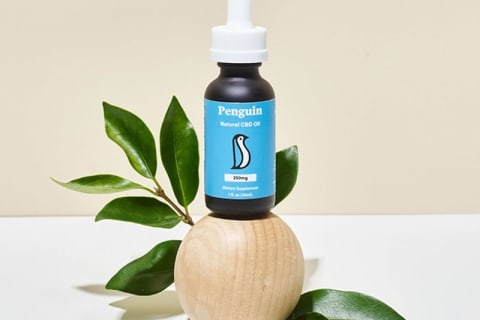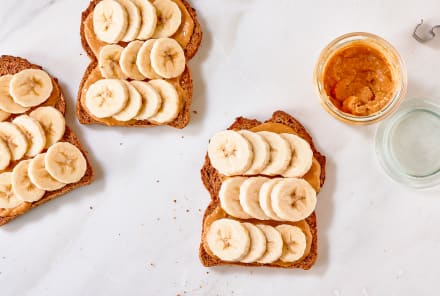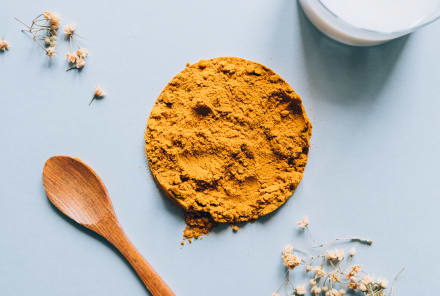Advertisement
5 Potential Benefits of Hemp CBD, According To Research & Experts*



These days it seems like hemp-derived CBD is touted as a tool for just about any ailment. But surely this singe cannabinoid can’t do it all. So what are the benefits of CBD?
Below, we uncover five research (and expert-backed) ways CBD could potentially help benefit your overall health.*
What does CBD affect you?
We’ve heard (and experienced) countless personal anecdotes about the benefits of CBD or cannabinol. But before you can understand the benefits of CBD, it's important to understand how it interacts with our body via the endocannabinoid system or ECS.
First discovered in the early 1990s, the ECS is a cellular-level network responsible for keeping our bodies in homeostasis. In other words, it helps us stay balanced across all major mental and physical functions, including pain, sleep, mood, stress, and even digestion.
Don't miss our guides to the best CBD gummies for sleep, CBD products for stress, and CBD oils for pain.*
CBD & the endocannabinoid system
If it sounds like the ECS has a big job, that’s because it does. But, as with every internal system, the ECS can get thrown out of whack.
The ECS has two main parts: cannabinoids and cannabinoids receptors. The two interact like a lock-and-key system, with cannabinoids binding to receptors and triggering widespread physiological effects.
Our bodies naturally produce cannabinoids that bind to CB1 and CB2 receptors1 in the ECS. But still, sometimes we develop deficiencies2. Phytocannabinoids (cannabinoids that come from plants like hemp) can pick up some of the slack.*
Before you think that CBD can replace your body's own cannabinoids, it's important to understand that the compound has some limits. Unlike other cannabinoids, CBD does not bind directly with receptors, but it can still interact with them.
While more research is still needed to understand the role CBD plays in our ECS, there is early insight into the process. As Mignon Walker, M.D., director of SLIP Emotional Resistance Building explains, “CBD’s overall impact is to restore balance and reduce inflammation.*"
Medical cannabis expert and double-board certified doctor, Dave Gordon, M.D., agrees that CBD’s ability to influence the ECS is what makes it such a versatile tool. “CBD is an extremely valuable therapy, and we can think of its benefits in different ways,” he says.
“CBD addresses the root causes of why we get sick,” Gordon goes on to explain. “For example, too much inflammation is part of the root causes of nearly every single chronic condition, and CBD helps reduce too much inflammation, thus potentially helping so many different individuals and issues. CBD helps balance an overactive nervous system, which again is a key root cause of so many different issues, like anxiety, depression, insomnia, gastrointestinal issues, and trauma responses just to name a few.”*
Now that we’ve established how CBD works within our bodies, let’s dig into what the research says about the possible effects and use cases for CBD.
Relieves aches and discomfort
While cannabinoid receptors are found in almost every organ of the body, their presence in the central nervous system3 and musculoskeletal system4 is relevant to the discussion of pain (and joint) concerns.
Many experts CBD interacts with the ECS to support the body's inflammatory response (potentially helping to prevent inflammation). Here's what we've actually seen play out in studies:
- This small study from 20205 found that people who used a topical CBD felt relief from nerve-related pain and itchiness.
- A 2019 study in rats6 found that CBD was helpful in reducing pain from nerve injuries and minimizing pain-related anxiety.
- Two case reports from 20207 found significant relief from using a topical CBD cream to treat lower-back neuropathic pain.
Promotes a more positive mood*
Another area of focus for CBD research has been around its impact on mental health. “In the brain, whole product CBD has improved a range of anxiety related issues, including generalized anxiety, social anxiety, and post traumatic stress. However, studies have been small and short term,” says Walker.
Several clinical trials have found CBD to be a helpful tool in combating feelings of anxiety8. This has been seen most in people with social anxiety disorder (SAD)9 and PTSD.10 “During somatic therapy sessions, I sometimes have patients take CBD to reduce their fear response, and facilitate working through difficult memories,” Walker adds.
Walker also calls out one animal study11 from 2019 in which rats had higher levels of BDNF after taking CBD12. BDNF is a chemical produced in the brain that helps regulate depression. “CBD binds to serotonin receptors, increasing mood through central receptors, and decreasing pain via peripheral receptors,” she explains.
Improves sleep*
Read the reviews for just about any CBD product out there, and you’ll find the most common positive feedback is from people who saw improvements in their sleep. “Many people use CBD to help improve the quality of their sleep while not risking dependence,” Walker agrees.*
In addition to the anecdotal reports, a 2019 case study found that 66% of patients who added 25 to 75 mg of CBD to their bedtime routine saw an improvement in their sleep within the first month13. This result is likely tied to the way CBD interacts with our parasympathetic nervous system (PNS). CBD is thought to direct our brains to activate our PNS14, signaling to our bodies that it's safe to enter a state of calm.*
It’s important to note that some sleep-promoting CBD products contain melatonin, which is not recommended for nightly use. Be sure to read the full ingredient list before committing to a CBD gummy or tincture for sleep.
May promote heart health*
“Current studies investigate the impact of CBD on various heart conditions, including inflammatory and functional issues involving the heart,” says Walker. One such study suggests CBD could be a promising treatment for cardiovascular diseases15, like heart failure.*
However, most trials to date use animal subjects, so more research on humans is necessary to understand CBD’s potential in this department.
Could help promote gut health*
A 2016 review found cannabinoids to be an effective treatment for irritable bowel disease and gut issues16 triggered by stress. However, the majority of the studies to date have been on mice so, again, more human research is needed to further understand CBD’s role in gut health.
Still, Walker says anecdotal reports support the current animal-based research. “Oral CBD in moderate doses can help maintain helpful bacteria in the gut.” she says.
What can't CBD do?
CBD alone won’t get you high
CBD and THC are both cannabinoids found in the hemp plant. If you only opt for CBD isolate—which doesn't contain any other parts of the hemp plant—then yuo won't need to worry about any intoxicating effects.
However full-spectrum hemp CBD products can have up to 0.3% THC per pound by dry weight. Within the federal legal limit, this trace amount of THC should not produce psychoactive effects in low doses.
But we'll be honest: There are some slippery slopes when it comes to full-spectrum hemp CBD products. Technicalities about dry weight have allowed some brands to get around THC limitations, with up to 5mg of CBD per serving.
While technically legal in most states, this is certainly enough to cause impairment.
CBD can’t cure disease.
Keep a skeptical eye out for brands that claim CBD products can cure or treat specific diseases. Certain conditions may benefit from hemp CBD.* Still, additional human-based research needs to be done before we fully understand the capabilities of CBD.*
CBD is not one-size-fits-all.
People experience the effects of hemp CBD differently. Your individual response will vary depending on a slew of factors such as product potency, quality, dosage, and bodyweight. If you’re new to CBD, it’s best to start with a lower potency (such as 15 to 20 mg) to see how your body responds. From there, you may choose to work your way up to a CBD product with a stronger potency.
How to pick the right CBD product
The CBD market is chock-full of brands claiming to be high-quality. While CBD is legal,17 it’s still unregulated by the FDA. Because of this, you’ll need to do your due diligence to ensure the product matches the packaging.
Luckily, there are a few markers of a trustworthy CBD brand. Seema Bonney, M.D., founder and director of the Anti-Aging & Longevity Center of Philadelphia, shares her tips for weeding out the bad (hemp) seeds:
“Make sure your CBD product is made by a company that discloses the source of their hemp, has no more than 0.3% THC according to the COA (certificate of analysis), and can provide proof of third-party testing by an ISO 17025-compliant lab,” advises Bonney.
She adds, “In functional medicine, we're focused on keeping our bodies free of toxins, so also ensure that your CBD product is [meets limits for] heavy metals, pesticides, and mold. This information can also be found on the COA.”
Whenever possible, prioritize brands that farm or source organic hemp. The most reputable certification to look for is USDA certified organic. However, there are brands that use organic farming practices without the official USDA stamp of approval.
If a company seems withholding information on its processes and certifications, look elsewhere.
Potential side effects of CBD
CBD is generally well-tolerated and considered safe for use. Still, as with any new supplement, some studies and CBD users have reported negative side effects.
- Diarrhea
- Changes in appetite
- Changes in weight
- Fatigue or drowsiness
It’s important to speak with your doctor or healthcare provider before using CBD, especially if you have a chronic condition or are on prescription medications. CBD is not recommended for anyone who is pregnant or breastfeeding.
FAQ:
Is it OK to consume CBD every day?
CBD is considered safe and is generally well-tolerated. However, this will depend on the quality of the product you use. CBD products with quality ingredients should be safe to consume daily. Just make sure the product underwent third-party testing from an accredited lab.
If you do run into any adverse symptoms, such as diarrhea, fatigue, or changes in appetite, discontinue use immediately. Again, it’s best to speak with your doctor or healthcare provider before taking CBD if you have a medical condition.
How much CBD should a beginner start with?
As we mentioned earlier, everybody processes CBD differently. Beginners are best starting with a gentle dose (20 mg and under) and trying it consistently before moving on to a higher potency.
At mindbodygreen, we standardize strength based on be below guidelines:
Gentle: Under 20 mg
Moderate: 20 to 40 mg
Strong: 40+ mg
Who should avoid taking CBD?
People who are pregnant or breastfeeding should avoid using CBD. Additionally, if you’re routinely drug tested, you should avoid full-spectrum CBD. The trace amounts of THC within those products can trigger a positive drug test.
The takeaway
Cannabinoid researchers have a ways to go in determining the known benefits of CBD. Still, current data is encouraging and experts believe CBD is a product worth paying attention to. Because the industry is unregulated, it’s imperative that you do your homework when shopping for a hemp CBD product. We have plenty of high-quality recommendations from transparent brands that use third-party testing. Whether you’re seeking a CBD gummy, oil tincture, capsule, or balm, we’ve got you covered.
*These statements have not been evaluated by the Food and Drug Administration. These products are not intended to diagnose, treat, cure, or prevent any disease.
If you are pregnant, breastfeeding, or taking medications, consult with your doctor before starting a supplement routine. It is always optimal to consult with a health care provider when considering what supplements are right for you.
Disclaimer: Our website includes general information and instruction relating to health and wellness topics. This content is not a substitute for medical advice from your health care provider. All treatment decisions should be determined in partnership with a health care practitioner. Hemp CBD products are derived from U.S. industrial hemp (less than 0.3% THC) and European hemp (less than 0.2% THC). While CBD products derived from the hemp plant (Cannabis sativa) are legal on a federal level in the U.S., some states have specific laws, so you'll want to check your state's laws to be sure.
17 Sources
- https://www.ncbi.nlm.nih.gov/pmc/articles/PMC5877694/
- https://pubmed.ncbi.nlm.nih.gov/15159679/
- https://www.ncbi.nlm.nih.gov/pmc/articles/PMC5209363/
- https://www.sciencedirect.com/science/article/pii/S1471489220300229
- https://pubmed.ncbi.nlm.nih.gov/31793418/
- https://www.ncbi.nlm.nih.gov/pmc/articles/PMC6319597/
- https://pubmed.ncbi.nlm.nih.gov/32421842/
- https://pubmed.ncbi.nlm.nih.gov/31866386/
- https://journals.sagepub.com/doi/10.1177/0269881110379283
- https://www.frontiersin.org/articles/10.3389/fnins.2018.00502/full
- https://pubmed.ncbi.nlm.nih.gov/29869197/
- https://www.frontiersin.org/articles/10.3389/fncel.2019.00363/full
- https://www.ncbi.nlm.nih.gov/pmc/articles/PMC6326553/
- https://pubmed.ncbi.nlm.nih.gov/28249817/
- https://www.ncbi.nlm.nih.gov/pmc/articles/PMC7641267/
- https://www.ncbi.nlm.nih.gov/pmc/articles/PMC5333598/
- https://www.fda.gov/news-events/congressional-testimony/hemp-production-and-2018-farm-bill-07252019

5 Subtle Signs You Might Be Low In Omega-3 Fats & What To Do About It
Molly Knudsen, M.S., RDN

This Antioxidant-Rich Fruit Is A+ For Sleep & Recovery, Research Shows
Molly Knudsen, M.S., RDN

Which Is Healthier: One Drink Daily Or A Few Drinks On The Weekend?
Molly Knudsen, M.S., RDN

5 Subtle Signs You Might Be Low In Omega-3 Fats & What To Do About It
Molly Knudsen, M.S., RDN

This Antioxidant-Rich Fruit Is A+ For Sleep & Recovery, Research Shows
Molly Knudsen, M.S., RDN

Which Is Healthier: One Drink Daily Or A Few Drinks On The Weekend?
Molly Knudsen, M.S., RDN

5 Subtle Signs You Might Be Low In Omega-3 Fats & What To Do About It
Molly Knudsen, M.S., RDN

This Antioxidant-Rich Fruit Is A+ For Sleep & Recovery, Research Shows
Molly Knudsen, M.S., RDN

Which Is Healthier: One Drink Daily Or A Few Drinks On The Weekend?
Molly Knudsen, M.S., RDN

5 Subtle Signs You Might Be Low In Omega-3 Fats & What To Do About It
Molly Knudsen, M.S., RDN

This Antioxidant-Rich Fruit Is A+ For Sleep & Recovery, Research Shows
Molly Knudsen, M.S., RDN

Which Is Healthier: One Drink Daily Or A Few Drinks On The Weekend?
Molly Knudsen, M.S., RDN













